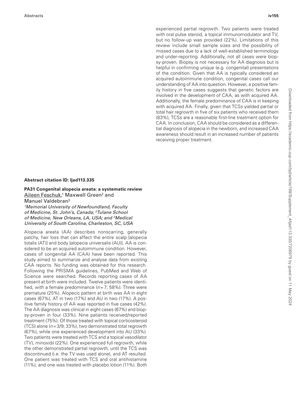Congenital Alopecia Areata: A Systematic Review

TLDR Congenital alopecia areata may have genetic links and topical corticosteroids are an effective treatment.
This systematic review analyzed data from reported cases of congenital alopecia areata (CAA), a condition where hair loss is present at birth, which challenges the typical understanding of alopecia areata (AA) as an acquired autoimmune condition. Twelve patients were identified, with a female predominance (58%) and a positive family history of AA in 42% of cases. The alopecic pattern at birth was AA in 67% of cases, AT in 17%, and AU in 17%. Diagnosis was clinical in 67% and biopsy-proven in 33%. Treatments varied, with topical corticosteroids (TCS) alone showing total regrowth in 67% of treated cases. The review highlights the potential role of genetic factors in CAA, given the family history and female predominance, and suggests TCS as a reasonable first-line treatment, with 83% of patients treated with TCS experiencing partial or total hair regrowth. The study faced limitations such as small sample size and potential under-reporting due to lack of established terminology. The review concludes that CAA should be considered in the differential diagnosis of newborn alopecia and that increased awareness could lead to more patients receiving appropriate treatment.


